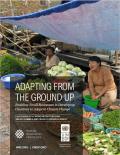This policy brief summarizes findings from an emerging portfolio of research by Climate Policy Initiative (CPI) on the role rural credit plays in Brazil. CPI analysts determined that rural credit makes a significant difference in raising agricultural productivity and improving land use. They show that an increase in rural credit lending leads to improvements across a number of agricultural indicators, including municipal crop production, agricultural GDP, total municipal GDP, cropland productivity, and rural worker crop productivity. The analysts conclude that lack of financial resources often limits farmers’ production possibilities in Brazil. Improved credit access allows producers to make new decisions that lead to higher productivity.
The report Navigating the Structure of Research on Sustainable Development Goals reveals how global research and discovery is evolving to address poverty, reduce inequality and deal with the effects of climate change via the UN Sustainable Development Goals (SDGs).

This report proposes a step-by-step framework for addressing the needs of small businesses in adapting to climate change. It discusses the factors driving micro and small enterprises (MSEs) to invest in adaptation, the breadth of barriers that they face, and interventions that policymakers can implement to address these barriers. It also includes detailed case studies on Zimbabwe, Cambodia, Tajikistan, and Nicaragua.
This study aims to (1) assess the demand for vegetables from formal buyers in Lesotho, (2) examine the current production and marketing strategies of commercial vegetable farmers practicing protected farming, and (3) suggest the design of the pilot supplier development program (SDP) to improve formal market access for smallholder farmers. The focus of this study is on Maseru, as it is the main center of demand in the country.
The report presents case studies across the six dimensions of Global Public Procurement (GPP) implementation.
